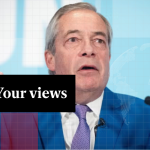The signing of the Belfast Agreement in 1998 brought an end to decades of extreme political violence in Northern Ireland. But more than 20 years later, the peace process still faces threats and both loyalist and republican paramilitary groups continue to operate.
Since 2016, annual security statistics in Northern Ireland have shown a general decline in terrorist activity against the state and its institutions. And the UK government also recently reduced the threat level from Northern Ireland-related terrorism from “severe” to “substantial” – meaning an attack is considered to be “likely” but not “highly likely”. This is the first time in 12 years that the threat level has been lowered.
But difficulties surrounding the Northern Ireland protocol – the post-Brexit arrangements for cross-border trade between the UK and EU – have unsettled significant sections of the unionist and loyalist community. Just days after the threat level was lowered, a loyalist paramilitary group was blamed for a bomb hoax that led to Northern Irish foreign minister Simon Coveney being evacuated from an event in Belfast.
Loyalists opposed to the protocol view border checks on trade flowing between Great Britain and Northern Ireland as an assault on the fabric of the union that comprises the UK. They view the protocol as a mechanism that could encourage a united Ireland.
Irish government statistics show that trade between north and south has increased since Brexit, bolstering the argument that the protocol is strengthening economic ties between the north and south. Loyalists and unionists view this as a stepping stone towards closer political union.
Potential for violence
During the Troubles, customs posts became targets for IRA attacks. The mere threat of a return to such violence was enough to end discussion about reinstating a border on the island of Ireland after Brexit. Some loyalist groups appear to have taken inspiration from this turn of events and believe that threatening violence against border infrastructure in the Irish sea will help them challenge that border too.
Mainstream loyalists have suggested there is potential for dissident loyalist paramilitary groups to formally organise in violent opposition to the protocol.
Since early 2021, waves of protest and sporadic street violence have occurred across Northern Ireland, some of which the police have claimed were orchestrated by pro-British loyalist paramilitaries. In April 2021, violent clashes between rival communal factions in Belfast were seen as some of the worst rioting since the 1969-1998 conflict. These clashes stemmed from anti-protocol demonstrations in Belfast.
A lack of progress at the political level has further exacerbated protests. In February, thousands of people gathered in the small County Armagh village of Markethill to hear anti-protocol speeches.
Polarisation and rivalry among unionists was evident at the rally. DUP MP Sammy Wilson was heckled by some parts of the crowd over the DUP’s apparent softening on the border question, allowing the Westminster government to impose economic checks at the sea border.
Northern Ireland Assembly elections are approaching in May and whichever government emerges from that contest needs to come up with a solution to the border question. Division among unionist parties makes that difficult, if not impossible to achieve.
Dealing with instability
Recent policing operations have succeeded in combating terrorism from a security perspective. Still, ingrained politics firmly embedded in Northern Ireland’s post-Troubles society continue to stir up debate. The threat of violence from dissident republican organisations remains, and antagonism from sections of the unionist community has also markedly increased following the implementation of the protocol.
As the protocol issue has festered for so long, some unionist and loyalist factions will accept nothing short of its complete removal. The DUP has also recently called for the protocol to be scrapped in its entirety.
The difficulty for the UK and EU governments is finding an alternative that deviates from the use of border infrastructure, either at the ports of Belfast and Larne or at the border between Northern Ireland and the Republic. Without this, the threat of violence in Northern Ireland will remain.
Defusing tension within Northern Ireland is crucial to ensuring the continued success of the peace process. While the Northern Ireland protocol forms a small but crucial piece of a very large Brexit agreement between two major economic trading blocs (the UK and the EU), the fallout could reignite one of the world’s most intractable sectarian conflicts.
Dale Pankhurst receives funding from ESRC NINE DTP. He is also a member of a political party in Northern Ireland.










